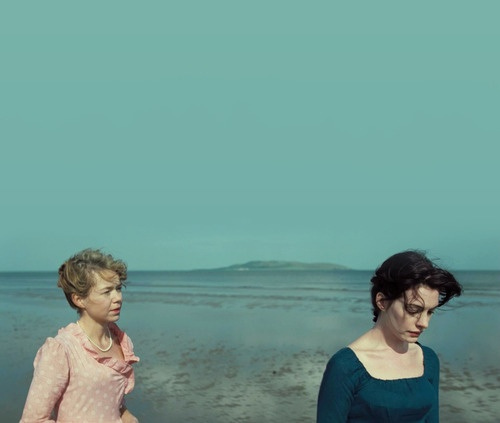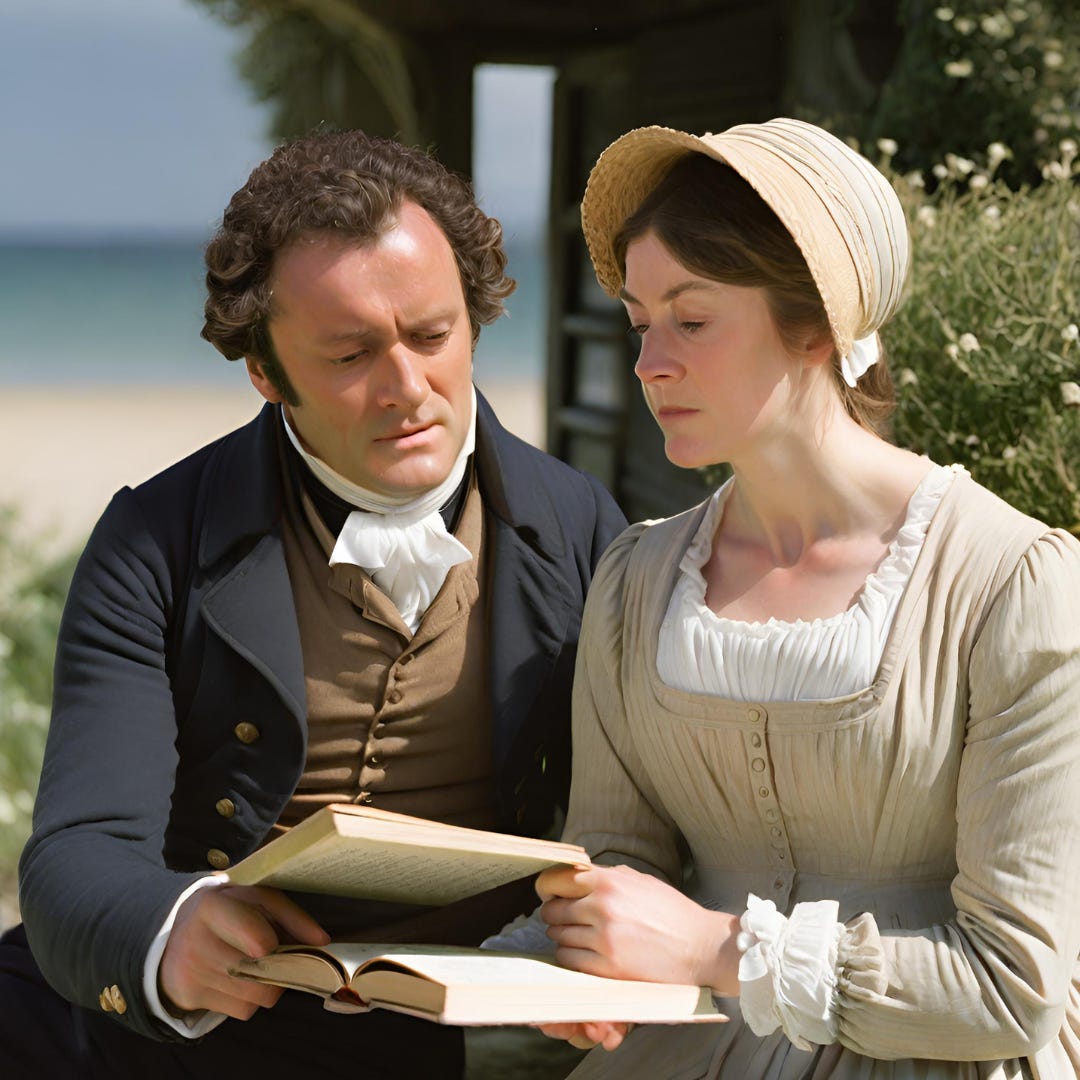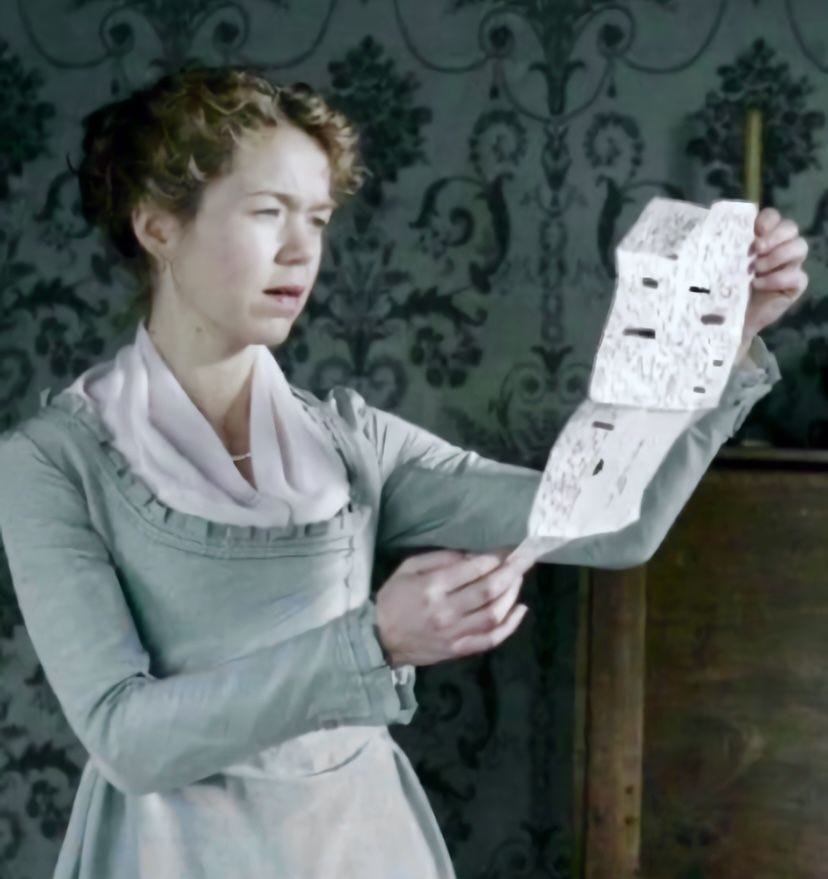Welcome to part two of this reading of Jane Austen’s Persuasion through the lens of brain injury. Here’s part one, in case you missed it.
📖🧠 Persuasion is a TBI story
I’m a longtime Austen cinema fan who has barely read any Austen. Other than wanting to catch up on the canon and be less of an imposter, I wonder if I’ve been drawn to her in this p…
Louisa Musgrove’s injury is a plot device that ultimately serves to reunite Anne with Captain Wentworth by exposing weaknesses in Captain Wentworth’s and Louisa’s relationship, and yet it’s so much more than a mere inciting incident. Through it, Austen offers a meaningful window into how people—the social creatures of the nineteenth century she was surrounded by—deal with grief and neurotrauma.
Social Talk
In an era where social talk rules supreme, and characters trade interesting tidbits back and forth about their neighbors, Louisa’s injury becomes a point of conversation. Lady Russell learns of the accident almost the moment she returns home, “but still it must be talked of, she must make enquiries, she must regret the imprudence, lament the result, and Captain Wentworth’s name must be mentioned by both.” When Anne and Lady Russell pay a visit to the Crofts, naturally “the sad accident at Lyme was soon the prevailing topic.”
Mrs. Croft and Lady Russell set to work piecing together an understanding of the facts from their perspective and offer the judgments “that it had been the consequence of much thoughtlessness and much imprudence; that its effects were most alarming, and that it was frightful to think, how long Miss Musgrove’s recovery might yet be doubtful, and how liable she would still remain to suffer from the concussion hereafter!”
The Admiral, in his folksy way, exclaims to Anne, “ ‘Ay, a very bad business indeed.—A new sort of way this, for a young fellow to be making love, by breaking his mistress’s head!’” Anne finds the Admiral’s “goodness of heart and simplicity of character . . . irresistible.” I can’t decide whether to take personal offense at his response or brush it off as an inept attempt at making sense of a nonsensical tragedy. I don’t think he means to be unkind, but his words fall on my ears as someone who has experienced jokey responses when I tell people about a my brain injury.
It reminds me of when people involuntarily laugh in response to seeing someone get hurt. Joking is one way of emotionally coping. It’s like people’s brains literally short out; to keep from crying they laugh. But the Admiral is getting at the truth of Wentworth’s carelessness in how he’s gone about dealing with Louisa.

When Mary and Charles Musgrove Jr. return to Uppercross, where Anne awaits her journey to Bath, they bring a favorable report of Louisa’s progress. The description of this stage of healing strikes me as fairly accurate to brain injury recovery in real life: “They had left Louisa beginning to sit up; but her head, though clear, was exceedingly weak, and her nerves susceptible to the highest extreme of tenderness; and though she might be pronounced to be altogether doing very well, it was still impossible to say when she might be able to bear the removal home.”
“They had left Louisa beginning to sit up; but her head, though clear, was exceedingly weak, and her nerves susceptible to the highest extreme of tenderness.”
I’m imagining riding in a carriage over gravel roads immediate after a brain injury; my head went spinning whenever the car turned too quickly around the corner. The sensory overwhelm of light, noise, and erratic, bumpy movement would have been acutely painful! No doubt it was best for Louisa to stay by the sea until her symptoms stabilized.
Benwick, grieving
While in Lyme, Mary had an enjoyable time fancying herself useful to Louisa, attending church, touring Charmouth, and checking out books from the library. Charles and Mary gossip about Captain Benwick. Charles invited him to come shooting, which he initially agreed to, but then excused himself.
Unwilling to be outdone by Anne or her own husband, Mary tries to lay claim over her acquaintance with Captain Benwick. She nods to the burden of grief and trauma he bears, and yet she still thinks socializing could be enough of an incentive to overcome his limitation: “I found, that he did not mean to come. I suppose he was afraid of finding it dull; but upon my word I should have thought we were lively enough at the Cottage for such a heart-broken man as Captain Benwick,” Mary chirps.
Charles cites the real set of reasons gives for Captain Benwick begging off coming. Reading between the lines, Benwick clearly seems socially overwhelmed by the Musgroves and was most comfortable with Anne. When he finds out she lived three miles away from where he’d be staying, he apparently decides the trip is not worth the time he’d have to spend with the Musgroves. Perhaps the reasons he gives are all pretense. Maybe he finds himself drawn more and more to spend time with Louisa, as their rapid romance could suggest in hindsight.
How unbearable it must have been to be among happy people when the light of his life had gone out!
Benwick’s reversal shouldn’t have been a surprise. When the group from Uppercross first comes to Lyme, Benwick joins Captain Harville in visiting the party one evening, “which was more than expected, it having been agreed that Captain Benwick had all the appearance of being oppressed by the presence of so many strangers. He ventured among them again, however, though his spirits certainly did not seem fit for the mirth of the party in general.” How unbearable it must have been to be among happy people when the light of his life had gone out!
That same night Anne manages to engage Benwick in a conversation about literature and she discovers that Benwick, though shy, . . . did not seem reserved.” He is full of feelings about his reading and is perfectly willing to share them. Here we have a hint that the Benwick we are seeing in his hour of grief is not the Benwick Captain Wentworth would have known a year or more ago.
Even though Anne is no stranger to traumatic loss, she still slips into moralizing to try to bring Benwick out of his grave depression:
“She had the hope of being of real use to him in some suggestions as to the duty and benefit of struggling against affliction . . . mentioned such works of our best moralists, such collections of the finest letters, such memoirs of characters of worth and suffering, as occurred to her at the moment as calculated to rouse and fortify the mind by the highest precepts, and the strongest examples of moral and religious endurance.”
Austen illustrates that the need to compulsively cheer up someone who is suffering with a grief that cannot be soothed is deeply human and very hard to remove from conversational repertoire. Benwick is grateful that someone has taken an interest in his situation and writes down the titles Anne suggests “with a shake of the head, and sighs which declared his little faith in the efficacy of any books on grief like his.” Afterward Anne reflects on the situation, knowing “that, like many other great moralists and preachers, she had been eloquent on a point in which her own conduct would ill bear examination.”
With Benwick, Jane Austen offers a view of what neurotrauma looks like a year after his initial injury took place.
Losing a loved one traumatically, as Benwick lost his fiancée Fanny, significantly rewires the brain and is a kind of brain injury. Neurologist Lisa Schumann says, “The emotional trauma of loss results in serious changes in brain function that endure.”1 With Benwick, Jane Austen offers a view of what neurotrauma looks like a year after his initial injury took place. He is not back to “normal”; he can’t socialize in a trivial way. He has immersed himself in literature “which imaged a broken heart, or a mind destroyed by wretchedness” that speaks to his situation and wants to convey the deeper feelings of his heart, as reflected in the poetry he reads, to those who are safe and will listen.
Brain injury births a new social reality
A brain injury of any kind, whether through grief or a direct blow, is transgressive. It violates expectations for how the injured person fits in to their culture and relationships—damage to the meeting of the minds mentioned in the last issue. Just as it is distressing for the one with the injury, so too it is distressing for everyone around them to relate to them as an injured person.
There’s a learning curve as people change their language and behavior to interact with an unfamiliar configuration of the person they once knew. We get glimpses into the contours of what this looks like as it relates to Louisa later on. In these conversations, we witness friends and family in the early process of rewiring their own brains to accept unexpected realities about what happened and what might be to come. In tragedy, words and best analyses fail. This is a new territory where old compasses no longer work, and the map is illegible.
Relating to friendly strangers about their grief, of whatever kind, is likewise a social mystery. Although none of the Uppercross people knew Benwick before his injury, they are engaged in commenting on his behavior, which proves to be different than they anticipated, revealing grief’s strange depths. Facing someone burdened by an unbelievably tragic event creates an inner panic that is almost impossible to suppress. Be better so I can feel better! Feel better so I can see that this event I know would wreck me has not wrecked you, that it is survivable.
To choose brain injury as a subject of a novel strikes me as especially daring and revolutionary. The more time I spend with this novel, the more curious I become to know whether Jane Austen knew anyone who had an accident like Louisa’s. Her understanding of the inner workings of a clan of family and friends sent topsy turvy by an unexpected medical event is so poignant that it suggests firsthand knowledge.

Cassandra, grieving
Indeed, one biographical incident that shadows the text is the fact that Jane’s older sister Cassandra suffered a loss that mimics Benwick’s, two decades before Austen wrote Persuasion. While in the West Indies, trying to earn money as a military chaplain, Tom Foyle died of an illness before he and Cassandra could get married. Anna Maxwell Martin practically rips my heart out as she portrays Cassandra mourning in Becoming Jane (2007)—a gripping, wild, irascible heart of grief; in reality Cassandra outwardly met the experience with numbness and eventual resignation.
Unlike the Eliot sisters, Jane and Cassandra were close friends and confidants. Eliza, Jane’s cousin, wrote of the sisters, “‘They seemed to lead a life to themselves within the general family life which was shared only by each other. I will not say their true, but their full feelings and opinions were known only to themselves. They alone fully understood what each had suffered and felt and thought.’”2 Jane saw Cassandra’s demeanor change, and perhaps she cloaked the incident in fiction to memorialize Cassandra’s lost love.
Austen had traveled to Bath, Anne’s next destination, twice around the time of Cassandra’s fiancée’s death. And just a few years later, her parents left Steventon to reside there. Jane lived in Bath for five years, and like Anne, she decidedly did not like it. Tellingly, Austen’s 1801–1806 letters were lost to Cassandra’s flames.
Before I reached Mrs. Smith’s story, I thought this would be two parts, but I have so much to say about her that I am keeping the series rolling. Plus, I want to keep these episodes relatively bite sized! Stay tuned for parts 3, 4, 5?
Amy Paturel, “The Traumatic Loss of a Loved One Is Like Experiencing a Brain Injury,” Discover, August 7, 2020, https://www.discovermagazine.com/mind/the-traumatic-loss-of-a-loved-one-is-like-experiencing-a-brain-injury.
David Nokes, Jane Austen: A Life (New York: Farrar, Straus, and Giroux, 1997), 171.








